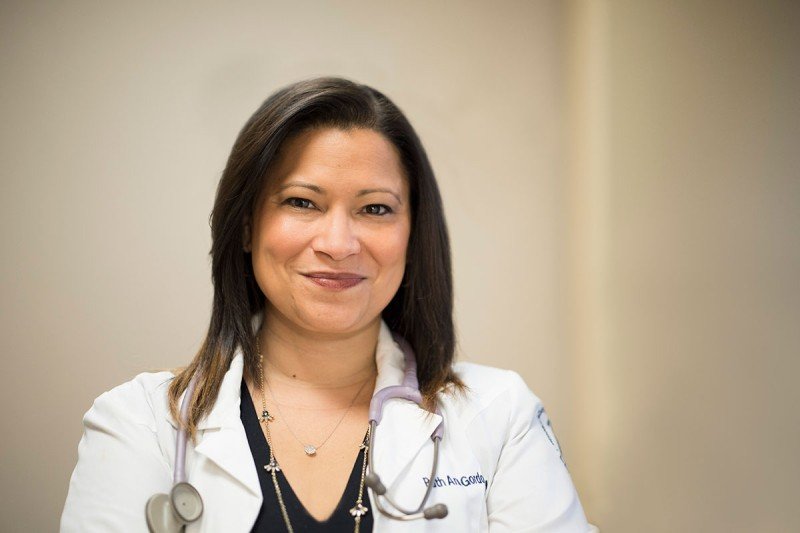
Clinical trials are research studies that test new drugs and therapies. MSK runs one of the largest clinical trials programs for cancer in the country — at any time, hundreds of clinical trials are underway at MSK locations in New York City and across the regional care network. Patients who choose to participate in a trial at MSK receive the most advanced cancer treatment available, sometimes years before it’s offered anywhere else. And they might be part of developing the next lifesaving treatment for cancer.
For RuthAnn (“Ruthy”) Gordon, Director of Clinical Trials Nursing, some of the best days are when the US Food and Drug Administration (FDA) approves a drug from a clinical trial that she worked on. It’s happened to her four times.
She often tells new nurses about that moment — as a reminder of the impact their hard work, and their patients’ commitment.
“It’s very difficult to tell a young mom that she needs to come in five times this week because the protocol says so,” says Ruthy. “But if we follow the protocol, and the drug gets approved, it could save that young mom and millions of other people. To see that happen is incredible.”
The Gatekeepers of MSK’s Clinical Trials
The American Nurses Association (ANA) designated clinical trials nursing as a specialty in 2016. Around the same time, MSK created the Clinical Trials Nursing division in collaboration with Clinical Research Administration to standardize the role of nurses within clinical research. Ruthy leads the division, which includes 172 nurses, including four nurse leaders. She works in partnership with Collette Houston, Vice President of Clinical Research Compliance, and Stephanie Terzulli, Vice President of Clinical Research Operations, to run the clinical trials enterprise under the leadership of Paul Sabbatini, Deputy Physician-in-Chief of Clinical Research.
“At MSK, we pride ourselves on having nurse leaders that are expert research nurses overseeing our teams,” Ruthy says.
Since the establishment of the Clinical Trials Nursing division, the approach to caring for patients on trials has changed. Rather than an office practice nurse from the appropriate disease management team (DMT) caring for the patient and a clinical trials nurse separately overseeing the patient’s participation in the trial, the clinical trials nurse does it all, providing clinical care for the patient while also running the trial.
The model for clinical trials at MSK is different from most other hospitals, says Ruthy. “We designed it this way because everything that touches a patient is protocol-related. The research nurse ensures that the protocol is followed and that everything is reported and documented appropriately.”
Clinical trials nurses also perform behind-the-scenes work that allows a trial to open and proceed, including enrolling patients, educating staff, and developing educational materials for patients like pill diaries, schedules, and calendars.
A patient on a clinical trial may see multiple doctors who aren’t involved with the study, but their research nurse is a constant, consistent figure in their care.
Dr. Sabbatini says: “Nurses make the clinical trial experience better for our patients, they are crucial in maintaining adherence to protocols and ensuring the integrity of the trial, and they help advance our understanding of cancer. They are essential to our research mission.”
Making Clinical Trials Larger and Safer
Research nurses bring invaluable expertise and support to a trial, which often allows an investigator to accumulate more patients — leading to a larger and potentially more diverse trial. Nurses also play a pivotal role in patient safety. They have the closest contact with patients and are often the first to identify side effects or other changes that could be related to a new treatment. In addition, through careful pre-trial eligibility determination and consenting, nurses make sure that a patient isn’t enrolled in a trial if it’s not an appropriate study for them.
A Few Perks of the Job: Innovation and Connection
Driving every clinical trial is a determination to find a better way to treat patients — and that requires curiosity, agility, and continuous learning.
“There’s always something new in clinical trials nursing,” Ruthy says. “I love that we’re constantly learning new things and working towards something big.”
Ruthy was part of “something big” while working on the Melanoma Service, where she worked on several pivotal clinical trials led by Jedd Wolchok that led to FDA-approved regimens for the itreatment of melanoma: ipilimumab (Yervoy®), nivolumab (Opdivo®), ipilimumab plus nivolumab, and pembrolizumab (Keytruda®). Dr. Wolchok is now Chief of the Immuno-Oncology Service.
She also enjoys the close relationships with patients that are a hallmark of clinical trials nursing. “We see so much of our patients and the connections can be profound,” she says. “We are privileged to help them navigate something that may be unpredictable and become a part of their lives along the way.”



